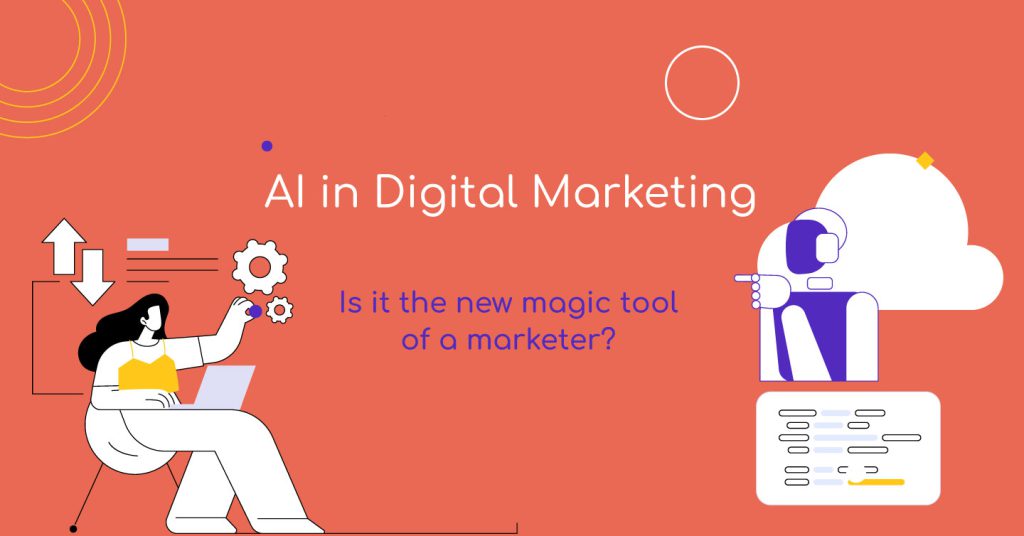In the fast-paced world of digital marketing, staying ahead of the curve is crucial for success. With the rapid advancements in artificial intelligence (AI), marketers now have powerful tools at their disposal to enhance their strategies, optimize campaigns, and drive better results. In this comprehensive guide, we’ll delve into the various ways AI can be utilized in digital marketing, along with real-life examples showcasing its effectiveness.
- Personalized Content Recommendations:
- AI-powered content recommendation engines analyze user behavior, preferences, and demographics to deliver personalized content recommendations.
- Example: Netflix uses AI algorithms to suggest movies and TV shows based on viewers’ past watching history and preferences, leading to increased user engagement and retention.
- Predictive Analytics for Customer Insights:
- AI enables predictive analytics by analyzing large datasets to forecast future trends, customer behavior, and preferences.
- Example: Amazon leverages AI to predict customer purchase behavior and recommend products, resulting in higher conversion rates and increased sales.
- Chatbots for Customer Service:
- AI-driven chatbots provide instant responses to customer inquiries, improve customer service efficiency, and enhance the overall user experience.
- Example: H&M uses chatbots on their website and social media platforms to assist customers with product queries, sizing information, and order tracking, leading to higher customer satisfaction levels.
- Dynamic Pricing Optimization:
- AI algorithms analyze market conditions, competitor pricing, and customer demand to dynamically adjust pricing for maximum profitability.
- Example: Uber utilizes AI to implement surge pricing during peak hours and high demand, optimizing revenue while maintaining competitive pricing.
- Automated Ad Targeting and Optimization:
- AI-powered platforms like Google Ads and Facebook Ads use machine learning to target the most relevant audience segments and optimize ad performance in real-time.
- Example: Airbnb employs AI algorithms to target potential guests based on their preferences, search history, and demographics, resulting in higher booking rates and ROI.
- Content Generation and Curation:
- AI tools can generate and curate content at scale by analyzing trends, audience preferences, and relevant data sources.
- Example: The Washington Post utilizes AI to generate automated news articles and personalized content recommendations, allowing them to deliver timely and relevant news updates to their readers.
- Sentiment Analysis and Social Listening:
- AI-powered sentiment analysis tools monitor social media channels and online discussions to gauge public opinion, identify trends, and measure brand sentiment.
- Example: Coca-Cola uses AI-driven sentiment analysis to monitor social media conversations about their brand, enabling them to respond promptly to customer feedback and mitigate potential PR issues.
- Predictive Lead Scoring:
- AI algorithms analyze lead data and behavior patterns to prioritize and score leads based on their likelihood to convert into customers.
- Example: Salesforce employs AI-powered lead scoring models to identify high-value leads and allocate resources more efficiently, resulting in higher conversion rates and sales productivity.
- Voice Search Optimization:
- AI-driven voice search optimization strategies help businesses optimize their content and SEO efforts for voice-enabled devices like smart speakers and virtual assistants.
- Example: Domino’s Pizza utilizes AI to optimize their website content for voice search queries, making it easier for customers to order pizza using voice commands via devices like Amazon Echo.
- Predictive Customer Lifetime Value (CLV) Modeling:
- AI models predict the future value of customers based on their past behavior, purchase history, and engagement metrics, enabling marketers to tailor their strategies accordingly.
- Example: Sephora uses AI-powered CLV models to identify high-value customers and personalize marketing campaigns to nurture long-term relationships, resulting in increased customer loyalty and lifetime value.
Conclusion: Artificial intelligence has revolutionized the digital marketing landscape, empowering marketers with advanced tools and capabilities to drive better results, enhance customer experiences, and stay ahead of the competition. By harnessing the power of AI-driven technologies, businesses can unlock new opportunities, optimize their strategies, and achieve greater success in today’s dynamic digital ecosystem.
